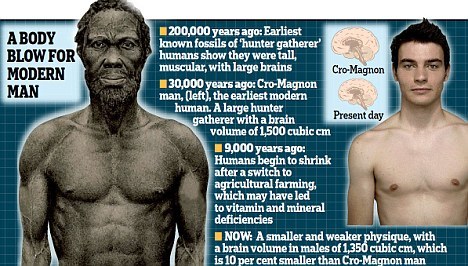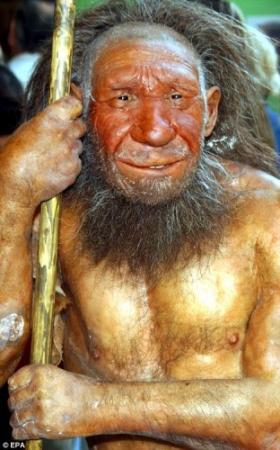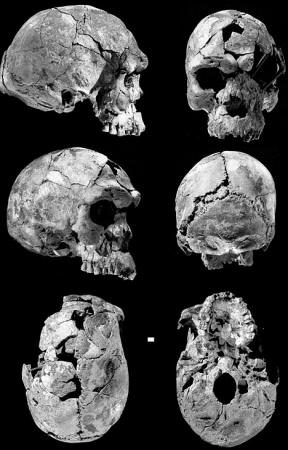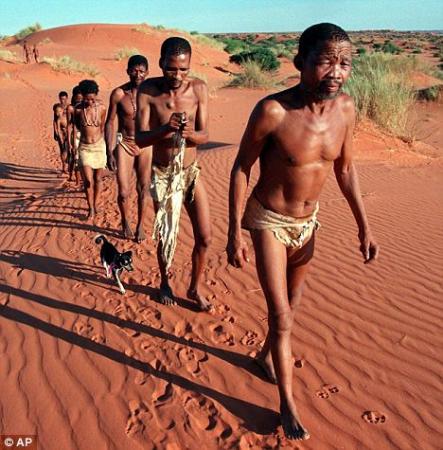
通过科学发明创造,现代人类不仅征服了世界屋脊,还成功登上了月球,人们都会觉得我们比远古人类祖先更加聪明。不过,据英国《每日邮报》报道,剑桥大学的科学家最近发现,人类早就已经过了自己的“黄金时代”:现代人类不仅在身高方面也比1万年前的祖先要矮上10%,脑容量也小了一些。
据报道,科学家们对在非洲、欧洲和亚洲发现的古人类化石进行了研究,结果显示,生活在1万年前的人类祖先平均体重在80至85公斤之间,而现代人类的体重则在70至80公斤之间。人类进化学家拉尔博士称:“早期人类在身型方面不断进化,但这一过程在1万年前突然停止,并开始走下坡路。”
科学家们认为,这与人类的饮食结构和生活习惯有关,农业的出现虽然让人类不需要通过狩猎为生,但也会让人类缺少维他命等营养物质的摄取量:比如中国早期的农民主要以荞麦为主要食物,这些粮食缺乏维他命B——人体生长所需的重要营养物质。而城市化进程也使得疾病易于传播。

不过,饮食结构与生活习惯的改变并不能解释为什么我们的脑容量也小了不少:2万年前的成年男性脑容量为1500立方厘米,现在只有1350立方厘米,减少的容积相当于一个网球大小。
虽然脑容量减少了,但并不等于我们变笨了;相反,现代人类其实更加聪明。拉尔认为,人类在发展、进化过程中逐渐减少了身体能量的消耗,这让我们的大脑在容量减小之后反而变得更加有效。
生物探索推荐英文原文
We're all getting smaller and our brains are shrinking... is farming to blame?
Having conquered Everest and landed on the Moon, it is tempting to think we are bigger and better than our ancestors.
But on a purely physical basis, it seems, we just don’t measure up. Mankind is actually shrinking.
Cambridge University experts say humans are past their peak and that modern-day people are 10 per cent smaller and shorter than their hunter-gatherer ancestors.
And if that’s not depressing enough, our brains are also smaller.

Pictured: Bigger brain: Six different views of a 160,000-year-old human skull of an adult male from Ethiopia
The findings reverse perceived wisdom that humans have grown taller and larger, a belief which has grown from data on more recent physical development.
The decline, say scientists, has happened over the past 10,000 years. They blame agriculture, with restricted diets and urbanisation compromising health and leading to the spread of disease.
The theory has emerged from studies of fossilised human remains found in Africa, Europe and Asia.
The earliest, from Ethiopia, date back 200,000 years, and were larger and ‘more robust’ than their modern-day counterparts, said Dr Marta Lahr,an expert in human evolution.
Fossils found in Israeli caves and dating from 120,000 to 100,000 years ago, reveal a people who were tall and muscular, a pattern that continued uninterrupted until relatively recent times.

Pictured: Palaeolithic lifestyle: The bushmen of the Kalahari desert are among the last people left on Earth who still live as hunter gatherers
An average person 10,000 years ago weighed between 12st 8lb and 13st 6lb. Today, the average is between 11st and 12st 8lb. Dr Lahr, who last week presented her findings to the Royal Society, Britain’s most prestigious scientific body, described the changes as ‘striking’.
‘We can see that humans have continually evolved but in body size it is not until the last 10,000 years that they have changed substantially, so the question is why this should have happened.’
The timing points to the switch from a hunter-gatherer lifestyle to agriculture, which began 9,000 years ago. While farming would have made food plentiful, focussing on a smaller number of foodstuffs could have caused vitamin and mineral deficiencies that stunted growth.
In China, early farmers relied on cereals such as buckwheat, rice and maize, all of which lack niacin, a B vitamin vital for growth.
However, the rise of agriculture does not explain why brains are also shrinking.
The male brain of 20,000 years ago measured 1,500 cubic centimetres. Modern man’s brain averages just 1,350 cubic cm – a decrease equivalent to the size of a tennis ball. The female brain has shrunk by about the same proportion.
It doesn’t mean we are less intelligent – rather we have learnt to make the best use of our resources.
Dr Lahr said: ‘Over evolutionary time there would have been huge energy savings in making the brain smaller but more efficient – as we see today with computer processors.’
Robert Foley, a Cambridge University professor of human evolution, said: ‘Becoming human, in an evolutionary sense, is a continuous and gradual process. Our species, rather than being a fixed entity, is more like a piece of putty, changing shape and dimensions all the time.’







